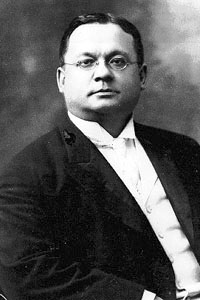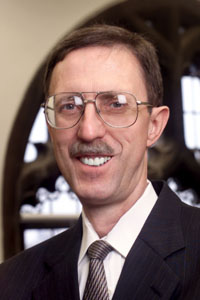Boyer’s newest paper features mastermind of Chicago’s educational rigor
By Julia MorseNews Office
 William Rainey Harper  John Boyer | |
This year marks the 100-year anniversary of William Rainey Harper’s death.
In honor of the University’s founding president, John Boyer, Dean of the College, has devoted the 10th in a series of occasional papers to the man he calls, “the University of Chicago’s greatest president.”
The essay, Broad and Christian in the Fullest Sense: William Rainey Harper and the University of Chicago, delves into the birth of the University and the “crucial role” that Harper played in its founding.
“With my 10th paper, I really wanted to think about what makes up the DNA of this place, to find out what gives it its unique identity,” Boyer said. “One always encounters the idea that we’re a very special university, but this special identity didn’t all fall from heaven. The story I’ve tried to tell is where all of this, what we have today, came from.”
In 1890, Harper was recruited by John D. Rockefeller to serve as the University’s first president and elected unanimously by the Board of Trustees; it was a role he held from 1891 until his death in 1906.
As President, Harper turned his dreams of what he called a “full-fledged” university into reality.
Under Harper’s direction, the University came to life all at once, complete with undergraduate and graduate degree programs, evening, summer and weekend courses, a Theological Seminary, a faculty of renowned scholars, science laboratories, museums, libraries, a female dormitory for women, a gymnasium and a focus on research, publishing and teaching among the administration and faculty.
“Harper believed that we were not merely preparing people for academic careers, but also to serve as civic leaders, with the University having a responsibility to make the world a better place through education and enlightenment,” Boyer said. Boyer emphasized that while Harper’s comprehensive vision is still alive at the University today, he hopes it will continue to be strengthened in the decades to come.
“In order to comprehend our present circumstances, we have to understand our past,” he said.
Boyer believes that three institutional and conceptual streams have shaped the University’s character: extraordinary wealth at the outset, a pronounced emphasis on academic values, and a “sublimated religious fervor” on behalf of the civic mission of education that gave strong purpose and meaning to the activities of the University.
He explained that the University was born out of enormous wealth given by John D. Rockefeller and other local Chicago donors, which gave the early faculty and administrators an “incredible sense of freedom not existent at any other university at the time.” Not only did this wealth come very quickly, but it also was unencumbered which encouraged the faculty to conceive of themselves as being fully responsible for their new University.
“Unlike Harvard or Yale, we weren’t always looking over our shoulder to what our predecessors did,” Boyer said. “We started out with extraordinary scholars, talented and ambitious students, and great amounts of money, but without the heavy hand of 18th and 19th century educational traditions.”
Rigorous educational standards, he explained, were also a rarity at the time Harper created Chicago, forcing young people to earn outstanding educations.
This is still the case today, according to Boyer “You can’t leave here without getting a great education,” Boyer added.
The “sublimated religious fervor” with which our founders endowed the University, Boyer explained, gave the place a powerful sense of moral certainty. This is what was meant when Harper said “searching for truth was searching for God.
“Harper gave the University a sense of purpose,” Boyer said. “He was profoundly convinced of its righteousness.”
In a letter to College alumni last fall, Boyer emphasized the value of putting today’s University in context of its history. Of Harper, Boyer wrote, “He had the courage to take large and often controversial risks to achieve his educational vision.”
Writing in his essay’s introduction, Boyer describes 2006 as “a noteworthy moment in our history,”—a year in which to shine a spotlight on Harper—100 years after his death.
“I think it’s important to remember and to honor what he did for us,” Boyer said.
Boyer has written nine other papers on the past and present of the University; most are available free of charge through the Office of the Dean of the College.
![[Chronicle]](/images/sidebar_header_oct06.gif)